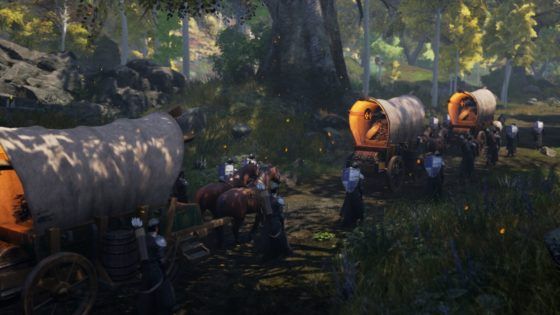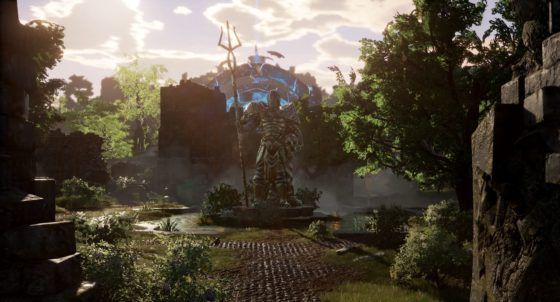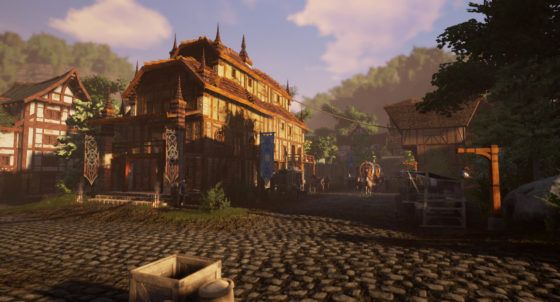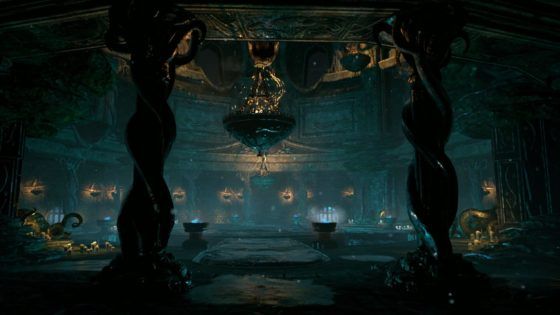I recently had the opportunity to chat with Steven Sharif, founder of Intrepid Studios and the Creative Director behind the nascent studio's upcoming MMORPG title Ashes of Creation.
Set on a fallen world untouched by civilization for thousands of years, our players will: Rebuild. Repopulate. Rediscover. Cities will rise and fall, their fates determined through force of will and power. This is something you’ve never experienced before - a completely unique world that never stops changing. - [Official Site]
The team behind Ashes of Creation promises a new type of MMO experience. One where the world is alive, growing and reacting to the players and the choices they make. It's a bold promise - so I reached out to Steven to learn more.
Hi Steven, thank you for taking the time to talk with me. I'd like to run through a few basic MMO systems questions for people who may not yet be familiar with Ashes of Creation, jumping to more specific questions based on what we know about Ashes later on.
The main promise of Ashes is a dynamic world that changes in reaction to player activity within the game world, with cities that rise and fall, quests that appear, disappear, and move about, all based on what the players are doing. It's tempting to characterize Ashes as a sandbox based on that level of player agency alone, but I'm curious - what type of MMO do you consider Ashes of Creation to be?
Honestly, I am hesitant to call Ashes a Sandbox. Not because of what Sandbox is supposed to mean, but rather because of how studios have developed “Sandboxes” over the past decade. You see, many developers have used the sandbox concept as an excuse to cut a lot of curated content, in exchange for gimmicky mechanics that allow for player-generated content. In Ashes, we have the opposite approach in development. In order for sandbox mechanics to mean something, there must be curated content to accompany the player’s choices. Which means, as the developers, we must create that Themebox style content but for every possible path the community may take. I like to compare our design philosophy, to that of a “Choose your own adventure” book. Our story is Epic, and you have the ability to be an integral part of that story. Dictating the outcome, in a meaningful way.
What's going to be the primary method for items entering the economy? Will endgame focused players be farming bosses for loot, or will they be hunting down their local crafter when preparing for battle?
Our crafters will be the epicenter of our item economy. However, those crafters, in order to create epic gear, depend on the bosses that arise in the story to be defeated. Essentially, we want players who focus their time and effort in crafting to be indispensable in their respective trade skills. Which also means, that the time dedicated to becoming an expert in those trade skills must be meaningful and intense. If everyone is a master crafter, then no one is.
Have you decided if there will be systems like permanent decay or item loss on death to maintain market demand?
We have developed a durability system that we feel is impactful, and also relies on the crafters in the world to continually upkeep gear for players without feeling like an encumbrance. More on this system will be discussed in a future blog.

We've heard a lot about progression of the world, but not too much about progression of our characters. Are you currently planning for traditional vertical power progression, or will progression be horizontal - more about unlocking new skills and greater build options for your character?
Simply put, both. Our player class advancement follows both a vertical progression in the traditional leveling sense, as well as a horizontal skill customization platform. When players start the game, they will be able to choose from 8 separate Archetypes. These archetypes represent the staple fantasy classes; Fighter, Tank, Rogue, Ranger, Mage, Summoner, Cleric, Bard. As the player progresses vertically with their primary class, they will have the opportunity to add a second class. This second class will be chosen again from the 8 archetypes, and will follow more of a horizontal progression. The second class will allow the player to augment their primary skills from their main class, with effects from their secondary class. For example; A fighter has a skill called “Rush”, that allows him to rush towards a target and upon reaching the target, deals x damage with a chance to knock the target down. If that fighter were to choose Mage as his secondary archetype (Spellsword), he would gain access to certain augments that he could apply to his primary skill tree. Let’s use his Rush skill as an example; As a Spellsword, he could choose to apply a teleportation augment to the Rush skill, which would allow the skill to now teleport you to the target, eliminating the charge time on the skill. Each skill in the primary tree will have several augment options from your secondary tree. The secondary skill augment tree will follow a horizontal progression that will be expanded upon further in a developer’s blog.
It would seem that keeping as much of the world relevant as possible at any given time would be of key importance with the major gameplay focus on players developing the areas around nodes, which can be tough in a vertical progression system. Will there be any scaling systems to ensure that world content is never over-leveled by players as they progress?
Each of our zones are designed to scale accordingly with the progress of our nodes. As a node develops into villages, towns, cities etc., the spawning zones in a node’s ZoI (Zone of Influence) will adapt and change to reflect its growth. Propagating in real time new individual and community activities that scale a wide range of levels, and quests that exist outside the normal vertical leveling systems. The interconnectivity of the node system will also influence storylines outside that nodes ZoI, impacting nodes that may develop across the world.
I find the idea of quests in a dynamically changing world to be really interesting. The Ashes website notes that the game will include "area quests, public quests, and quest chains that change dynamically and in real time based on the player’s experiences and choices." What type of role will questing play in both progression and the world? Will these be the main mechanism through which players level their characters and change the world itself?
We’re going to be breaking up what is traditionally called ‘questing’ into three different categories: Narratives, Events, and Tasks. We want to avoid going down the path of trying to force narrative into gameplay where it doesn’t really fit (ie: filler stuff that doesn’t really relate to what’s happening in the world), so what you find in the Narratives category is where you’ll find most of what you might call traditional quests. Because we’re jettisoning filler, we’ll have the resources to craft a really excellent story, with gameplay that reflects the scope of that story. Events are where you’ll find your public quests, though these will be scaled to fit local, regional, and global needs. They’ll also have consequences locally, regionally, and globally, for good (if they’re taken care of successfully) or for ill (if a fail condition is reached). Tasks are hyper-local to individual Nodes, and will be centered around developing the Node that they belong to. If you want to go kill five wolves, this is where you’d do it. You can kill five wolves on your own, and that will count toward Node progression, but if a Task is offered to kill five wolves, then both the Node and your character will get bonus XP when that task is completed. Tasks will be numerous and varied, and will reflect the different gameplay styles that players can engage in within Ashes – there will be crafting, exploration, combat, and gathering oriented tasks (among many others).
I fixated a bit on the word "dynamic" in the quote above. Are there any plans for dynamic events ala Guild Wars 2, or is that simply referring to quests adapting in response to the zones' evolution and the decisions players make?
We absolutely want to keep things fresh in our world, so much of what you’ll see in it can be described as dynamic. Dynamic to us means consequential. If an event occurs in the world, is the world better or worse for it? So yeah, we’ll be doing dynamic events as you understand them, but because each Node rises or falls because of player action, these events should be much more meaningful. If players discover a dragon’s nest, and then disturb it by looking for treasure, that action might cause the brood mother to awaken and ravage the local countryside (a local Event, described in a previous answer). The players in that local area are notified and must do what they can to defeat her. If they do defeat her, they’ve just taken down a dragon (the Node receives a morale boost of some sort), and hidden parts of her nest may now make themselves known. If they cannot, then the damage the brood mother causes (burning fields and houses, maybe de-levelling the Node in the process) is very consequential and can realistically change that local area in ways we can’t necessarily predict. Whatever happens, it’s a permanent change that the players will have to figure out how to respond to. And that tells a cool story without us having to write a single word.

In the recent dev blog diving into Ashes' reactive world, Nodes were described as growing to affect increasingly large areas around them as they progress, eliminating the opportunity for the node's environs to be developed on their own as those areas fall within its growing sphere of influence. This would seem to create a huge potential variety in the way maps can develop, which sounds like it could be a big strain if content is all being developed by hand. How are you currently planning to tackle that demand? Will we see procedural content generation making an appearance in some form?
You are absolutely right, this is a huge task that we’ve set for us, and is without a doubt, one of our biggest challenges. It’s solvable with procedurally generated content, but that ties our hands with regard to look and feel, two things that are incredibly important to us. So, the plan here is to do a little bit of procedural generation, and then help it along with good old-fashioned elbow grease. We have some other shortcuts that we’re working on as well, but at the end of the day, each Node should give the sense that it was lovingly crafted through every stage of its development.
We've seen already seen a glimpse of dungeon content in the water temple first look. How is this kind of content going to be affected by the node system? Will dungeons largely exist without being influenced by node progression, or will this type of content sometimes be unavailable if a node isn't in the right stage of progression?
Certain dungeons and other points of interest across the map will all be affected by the server’s node development. Some dungeons will only be unlocked if nodes are developed to certain stages. The storyline objectives for players inside dungeons will also be dependent on the story arc paths chosen through the node system. The drop tables in area and dungeons will also be tied into the progression of certain areas. For example, let’s say that the humans have developed a node in Region A, and a storyline has opened up that leads players to inspect the ruins (dungeon) of a nearby area. And let’s say that this node was developed in a scientific (crafting) zone… Well before the node developed, this dungeon was accessible… But now the dungeon has propagated new monster assets that include a drop table catering to a crafting emphasis because of the development of that scientific node. And perhaps, a new boss appears in different rooms of the dungeon that includes different adventure quest starts, like a mysterious item with a storyline that can only be progressed if a node develops to the metropolis stage in a certain region, across the world. Our system is so vast, when it comes to interconnectivity and how the world reacts to the players, it is difficult to explain in one Q&A, which is why we will have very in-depth developer’s blogs as we move further into our development.
It sounds like players who take the time to develop a node from a lowly expedition to a bustling city or metropolis will have reason to become sentimentally attached to the city. Will there be in-game mechanics making that attachment more official - like reputation, the ability to join the city's faction, or even the ability for player organizations to formally attach themselves to a node?
Yes, Yes and Yes.
When a node develops into stage 3, the village stage, it now has a citizenship associated with it. Players will be restricted to a certain number of citizenships. In order for players to gain citizenship, they must own housing in those nodes. Either open-world housing somewhere in that nodes Zone of Influence, or static housing within the node itself. Even Instanced housing is offered at the City stage 5 and Metropolis stage 6. Citizenship entitles you to a lot of benefits for that node including; Titles, reputation, honor, loyalty, merit, and probably most importantly is the nodes government. As a citizen you are granted the privilege of participating in a node’s government. From voting to running for office. The government has a lot of say in the direction of the nodes development. Directing assets, building projects, tax allocation, defensive ability etc. Players have the ability to not only create these cities, but they have the right of self-governance. Guild’s also hold separate roles in the direction of the node, than the roles held by private citizens, and only a certain number of guilds may participate in these roles. Separate guild roles are reserved for Small size guilds, medium size guilds and large size guilds.
PvP sounds like it's going to be a fairly important and tightly integrated portion of Ashes of Creation, especially with the cities themselves potentially coming under siege and being wiped from the face of the world. Will players who are disinclined to participate in that area of gameplay be able to completely avoid it?
No player is forced to participate in the PvP events of Ashes. But you are right to say that PvP is important. It is one of the primary catalysts for change in the world. And because change can impact all players, we feel that everyone should have a say in that change. We have incorporated roles for non-pvp oriented players to impact these PvP events. Such as developing the defensive abilities of cities and castles, or enhancing the defenses of our caravans, to creating faster mounts, and advanced weaponry that can be used by the PvPers. To discovering supplies and artifacts through PvE to aid in the battles waged by others. Ashes strives to create an inclusive atmosphere where participation in the direction of the world is not restricted to one particular form of gameplay.

What type of flagging system will be used for PvP in Ashes? Something completely open like Free-For-All, or a system limited to certain areas (like caravans and sieges), or maybe an incentivized factional opt-in system tied to established nodes, similar to Star Wars Galaxies' TEF system?
We are still developing our flagging system, but I can give you an overview of how it stands now. It is important to keep in mind, that players are not forced into PvP. If you want to influence the world around you through non-pvp methods, it is an equally viable option.
There are three states that a player can find themselves in: Non-Combatant (Green), Combatant (Purple), and Corrupt (Red). Everyone is a Non-Combatant by default. If a Non-Combatant attacks a Combatant or another non-combatant, then they become a Combatant for a period of time. Similarly, if a Non-Combatant enters a PVP zone (which includes things like Castles, City Sieges and Caravans) they are automatically flagged a Combatant while in the zone, and for a period of time after leaving that zone.
Players can kill Combatants without repercussions, and are encouraged to do so, since dying while a Combatant means you suffer reduced death penalties. Where this changes is when a Combatant kills a Non-Combatant. In this case, the Combatant is Corrupt, and acquires a Corruption Score (which is accrued based on a number of different parameters, including the level differential of their freshly slain victim). This Corruption Score can be worked off with effort through a few mechanics, but the primary means of getting rid of it is through death.
While a player is marked as Corrupt, they may be attacked by both Combatants and Non-Combatants. If a non-combatant attacks a corrupt player, the non-combatant will not flag as a combatant. We also have some other ideas that we haven’t formalized yet that will allow players to participate in what we feel could be a fun cat-and-mouse part of the game. As an example, the location of these corrupt players will be displayed on the map, if you have the Bounty Hunter title, which can be obtained through a quest available to a citizen from a Military zoned, Stage 4 (Town) Node. These are systems that we’re still working on, but Corruption is something we want to provide explicit gameplay opportunities for.
In any case, all this comes to a head via death penalties. A Non-Combatant who dies suffers normal penalties, which includes experience debt, durability loss, as well as dropping a portion of carried raw materials (which can then be looted). A Combatant who dies suffers these same penalties, but at half the Non-Combatant rate. A character who has a Corruption Score on the other hand, suffers penalties at three times the rate of a Non-Combatant, and has a chance to drop *any* carried/equipped items based on their current Corruption Score.
The idea here is to disincentivizes those who wish to gank or grief others, while rewarding those who engage in consensual PVP. We don’t want Ashes to be a murder box!
Again, this is the briefest of overviews, and I’m sure this explanation raises as many questions as it answers. It really demands a more thorough explanation, which we’ll get into in a developer blog. Also, keep in mind that Ashes is continually a work in progress – though I’ve given a lot of specifics here, what survives play-testing is anyone’s guess!

It makes sense that the largest groups of players will have the easiest time making their mark on the world by building up nodes. What's your vision for smaller organizations - guilds that only have maybe one or two dozen players - or even players who prefer to go it alone?
Many systems in our game involve parameters that cater to smaller groups and individuals. We don’t want to have our systems get dominated by the large guilds, and we have incorporated that philosophy when designing the game. Some parts of our game are meant to have a scope of smaller scales. So we have built the game with a Bottom-up mentality, allowing for foundations of many individuals and smaller-guilds to support the infrastructure required to allow for large guild activities. A symbiosis, so to speak, between the individual and the guild communities.
To wrap up, I love that you're a long-term MMO gamer who set out to make the game you've always wanted that would never have existed otherwise; after the disappointments of recent years, I know many of us have wished we could do the same. What about Ashes of Creation are you the most excited to be introducing to the MMO market?
I honestly feel that the gaming community is so unique, the MMO community in particular. I cannot think of any other venue where millions of human beings across the world can come together, instantly, to build relationships with one another. To solve problems with one another, to enjoy their time with each other. It bridges the divides of our separate cultures, our national borders and politics. That to me is just so amazing. I think that Ashes of Creation will create a new standard for the MMO genre. A game that evolves with its community. A world that reacts to the choices of its players. I think that this type of game, is the game that our genre has been in desperate need of for the past decade. Getting away from the cash grabbing, Pay2Win atmosphere that has plagued this genre, as of late. Making a world that is all about that adventure, discovery, building, conflict, cooperation and problem solving. My excitement is through the roof. I cannot wait to show the world what we have done so far.
Thanks for the opportunity to share with you.